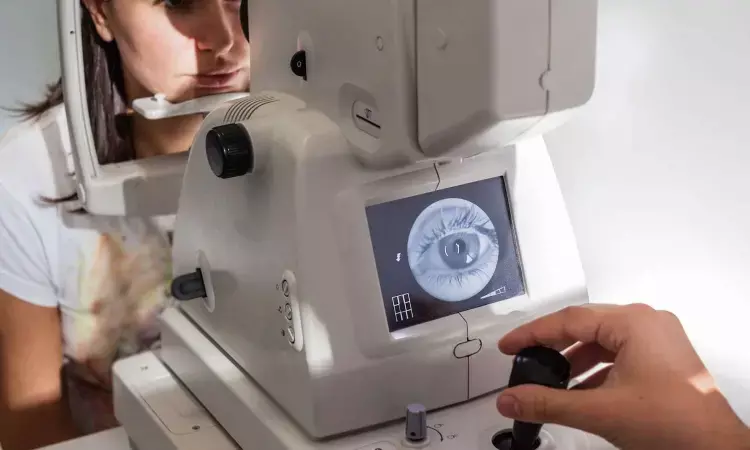- Home
- Medical news & Guidelines
- Anesthesiology
- Cardiology and CTVS
- Critical Care
- Dentistry
- Dermatology
- Diabetes and Endocrinology
- ENT
- Gastroenterology
- Medicine
- Nephrology
- Neurology
- Obstretics-Gynaecology
- Oncology
- Ophthalmology
- Orthopaedics
- Pediatrics-Neonatology
- Psychiatry
- Pulmonology
- Radiology
- Surgery
- Urology
- Laboratory Medicine
- Diet
- Nursing
- Paramedical
- Physiotherapy
- Health news
- Fact Check
- Bone Health Fact Check
- Brain Health Fact Check
- Cancer Related Fact Check
- Child Care Fact Check
- Dental and oral health fact check
- Diabetes and metabolic health fact check
- Diet and Nutrition Fact Check
- Eye and ENT Care Fact Check
- Fitness fact check
- Gut health fact check
- Heart health fact check
- Kidney health fact check
- Medical education fact check
- Men's health fact check
- Respiratory fact check
- Skin and hair care fact check
- Vaccine and Immunization fact check
- Women's health fact check
- AYUSH
- State News
- Andaman and Nicobar Islands
- Andhra Pradesh
- Arunachal Pradesh
- Assam
- Bihar
- Chandigarh
- Chattisgarh
- Dadra and Nagar Haveli
- Daman and Diu
- Delhi
- Goa
- Gujarat
- Haryana
- Himachal Pradesh
- Jammu & Kashmir
- Jharkhand
- Karnataka
- Kerala
- Ladakh
- Lakshadweep
- Madhya Pradesh
- Maharashtra
- Manipur
- Meghalaya
- Mizoram
- Nagaland
- Odisha
- Puducherry
- Punjab
- Rajasthan
- Sikkim
- Tamil Nadu
- Telangana
- Tripura
- Uttar Pradesh
- Uttrakhand
- West Bengal
- Medical Education
- Industry
Systemic fluoroquinolone use not associated with uveitis or retinal detachment risk, reveals study

A recent research published in the Journal of American Medical Association investigated the potential link between systemic fluoroquinolone use and an elevated risk of eye conditions like uveitis and retinal detachment. Fluoroquinolones are a class of antibiotics which have been previously associated with these risks in noninterventional studies. And so, the team led by Jeremy Brown estimated the association between systemic fluoroquinolone use and the development of acute uveitis or retinal detachment.
This comprehensive cohort study analyzed data from the Clinical Practice Research Datalink (CPRD) Aurum and GOLD UK primary care records databases which were linked to hospital admissions data. The study included adults who were prescribed either a fluoroquinolone or a comparator antibiotic, cephalosporin between April 1997 and December 2019. The extensive data analysis was conducted from May 2022 to May 2023. The participants were divided into two groups, where one group was prescribed fluoroquinolones and the other group was prescribed cephalosporins. The adults with uveitis or retinal detachment were separately analyzed in a self-controlled case series to further validate the findings.
The primary outcome was the diagnosis of acute uveitis or retinal detachment. This research estimated hazard ratios (HRs) in this study to determine the association between fluoroquinolone prescriptions and these eye conditions. The cohort study included a total of 30,01,256 individuals from the Aurum database and 4,34,754 individuals from the GOLD database.
The key findings of this study were as follows;
For uveitis, the pooled adjusted hazard ratios (aHRs) for fluoroquinolone use versus cephalosporin use were 0.91 at the first treatment episode and 1.07 over all treatment episodes. This indicated no significant increase in risk.
For retinal detachment, the pooled aHRs were 1.37 at the first treatment episode and 1.18 over all treatment episodes which suggests a potential but not statistically significant increased risk.
In the self-controlled case series, the adjusted rate ratios (aRRs) for uveitis during fluoroquinolone use versus nonuse were slightly increased during the initial 59 days but not significantly different for longer exposure periods. For retinal detachment, the aRRs showed no significant increase at any exposure duration. The findings of this study do not support a significant association between systemic fluoroquinolone use and a substantially increased risk of uveitis or retinal detachment. Overall, this study indicated that fluoroquinolone use does not pose a substantial threat to eye health when compared to other antibiotics.
Reference:
Brown, J. P., Wing, K., Evans, S. J., Leyrat, C., Mansfield, K. E., Smeeth, L., Wong, A. Y. S., Yorston, D., Galwey, N. W., & Douglas, I. J. (2024). Systemic Fluoroquinolone Use and Risk of Uveitis or Retinal Detachment. In JAMA Ophthalmology. American Medical Association (AMA). https://doi.org/10.1001/jamaophthalmol.2024.1712
Neuroscience Masters graduate
Jacinthlyn Sylvia, a Neuroscience Master's graduate from Chennai has worked extensively in deciphering the neurobiology of cognition and motor control in aging. She also has spread-out exposure to Neurosurgery from her Bachelor’s. She is currently involved in active Neuro-Oncology research. She is an upcoming neuroscientist with a fiery passion for writing. Her news cover at Medical Dialogues feature recent discoveries and updates from the healthcare and biomedical research fields. She can be reached at editorial@medicaldialogues.in
Dr Kamal Kant Kohli-MBBS, DTCD- a chest specialist with more than 30 years of practice and a flair for writing clinical articles, Dr Kamal Kant Kohli joined Medical Dialogues as a Chief Editor of Medical News. Besides writing articles, as an editor, he proofreads and verifies all the medical content published on Medical Dialogues including those coming from journals, studies,medical conferences,guidelines etc. Email: drkohli@medicaldialogues.in. Contact no. 011-43720751


